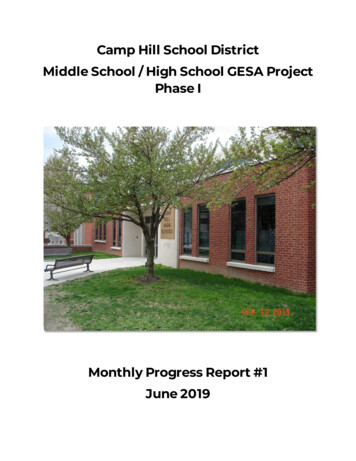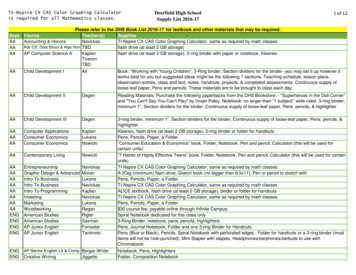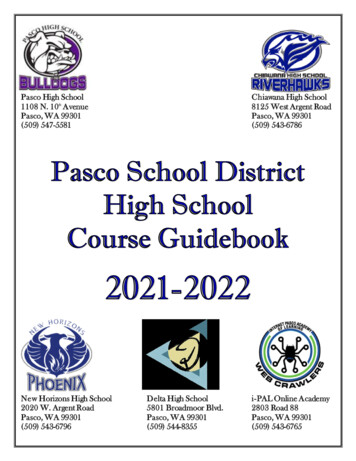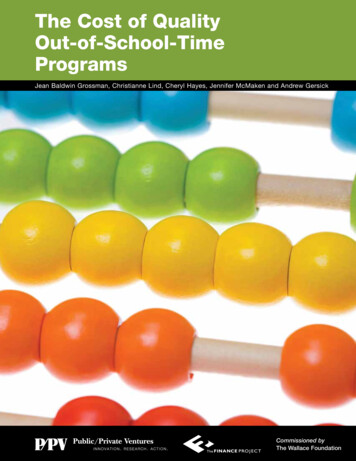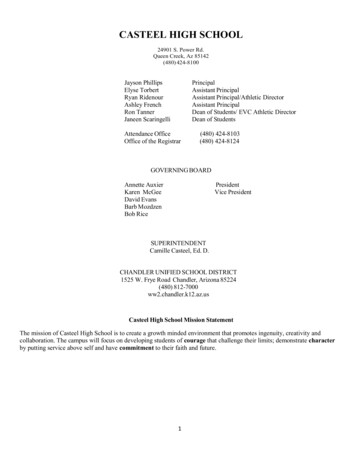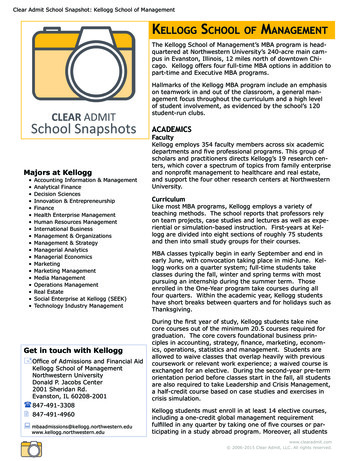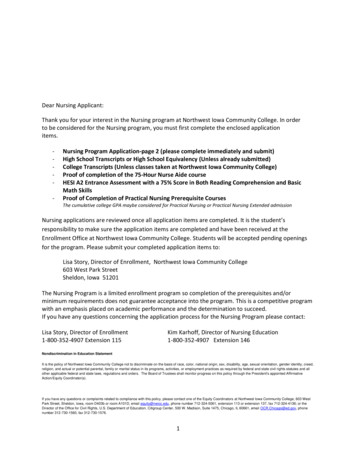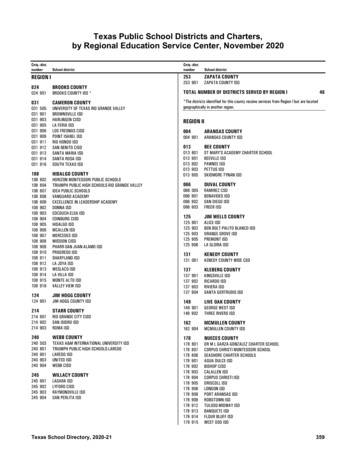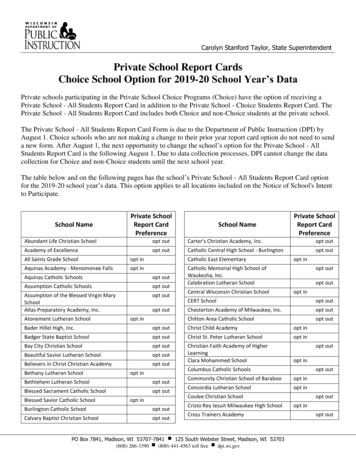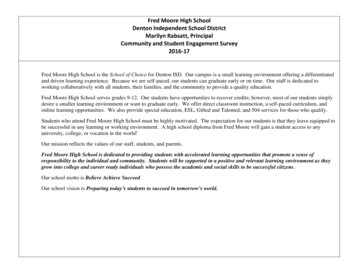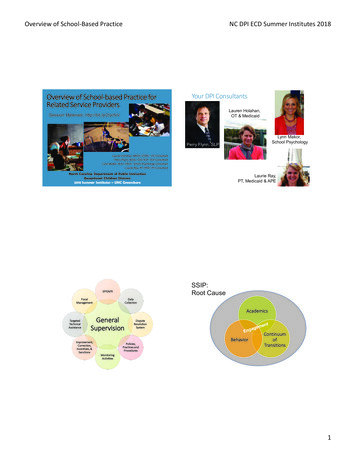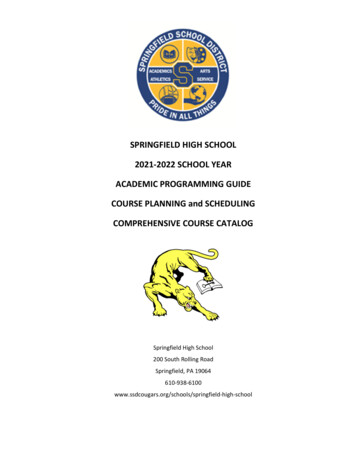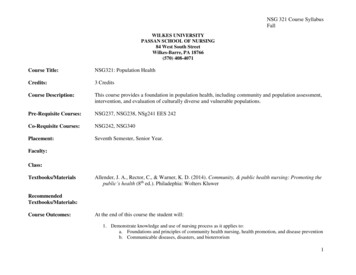
Transcription
NSG 321 Course SyllabusFallWILKES UNIVERSITYPASSAN SCHOOL OF NURSING84 West South StreetWilkes-Barre, PA 18766(570) 408-4071Course Title:NSG321: Population HealthCredits:3 CreditsCourse Description:This course provides a foundation in population health, including community and population assessment,intervention, and evaluation of culturally diverse and vulnerable populations.Pre-Requisite Courses:NSG237, NSG238, NSg241 EES 242Co-Requisite Courses:NSG242, NSG340Placement:Seventh Semester, Senior Year.Faculty:Class:Textbooks/MaterialsAllender, J. A., Rector, C., & Warner, K. D. (2014). Community, & public health nursing: Promoting thepublic’s health (8th ed.). Philadephia: Wolters KluwerRecommendedTextbooks/Materials:Course Outcomes:At the end of this course the student will:1. Demonstrate knowledge and use of nursing process as it applies to:a. Foundations and principles of community health nursing, health promotion, and disease preventionb. Communicable diseases, disasters, and bioterrorism1
NSG 321 Course SyllabusFall2.3.4.5.6.7.c. Population based public health based nursing practiced. Epidemiology and surveillancee. Care of special populations including global perspectivesf. Public health policyApply the nursing process, standard of care, and identified psychomotor skills to provide competent nursingcare in simulation based learning experiences.Contribute to the community of interest through civic engagement.Exhibit accountability and responsibility for self-directed learning behaviors as an adult-learner.Apply relevant and current evidence from the nursing literature to plan nursing care.Participate in activities designed to influence health care policy and practiceParticipate in inter-professional collaborative activities.Teaching Strategies:The following teaching strategies may be utilized:1. Lecture2. Group discussion3. Case studies4. Group activity5. Inter-professional activity6. Field trip7. Clinical8. AssignmentsDescription:University Mission:To continue the Wilkes tradition of liberally educating our students for lifelong learning andsuccess in a constantly evolving and multicultural world through a commitment to individualizedattention, exceptional teaching, scholarship and academic excellence, while continuing theUniversity’s commitment to community engagement.Passan School of Nursing Mission:The mission of the Passan School of Nursing is to promote interprofessional practitioners ofnursing, who provide quality health care in a constantly evolving multicultural world, engage inlifelong learning, and expand nursing science through scholarship, technology, and academicexcellence, while engaging in community service2
NSG 321 Course SyllabusFallRequirements andEvaluation Components:Assessment of the student’s progress is an ongoing process involving the student and instructor. The finalgrade is the composite of the theoretical.The stated course outcomes serve as the basis of evaluation. Course evaluation tools vary and may includeunit quizzes, unit exams, a final exam, term project, and written assignments.Tests will be objective and/or subjective. Tests will include materials from lectures, readings, and CNSCassignments (Specific to Physical Assessment). If a discrepancy exists among resources, the requiredtextbook is considered the final authority on the subject.Unannounced quizzes and assignments may be given at any time and additional readings may be assigned.All unit and final exams must be taken on the scheduled dates. Test dates are subject to change withadequate notification by faculty. If a student is unable to be present for an exam, the student must contactthe instructor prior to the exam for permission to miss the exam. If this is not done, a makeup examinationwill not be given and the test score will result in a “0”.Equivalence of grades:The theory grade is determined by the following:4.0 92 – 100 %3.5 88 – 91%3.0 84 – 87%2.5 79 – 83%2.0 75 – 78%1.5 70 – 74%1.0 65 – 69%0.0 less than 65%PROGRESSION POLICYIn order to progress INTO clinical nursing courses, students must: Complete the ATI/TEAS test examo Wilkes University’s Passan School of Nursing requires that the student score 58.7 or higher,including the Accelerated Baccalaureate students.3
NSG 321 Course SyllabusFall Earn a 2.5 or better in all prerequisite nursing courses:o BIO 113 (Microbiology); BIO 115, and 116 (Anatomy and Physiology I and II); CHM 111(Fundamentals of Chemistry); and ENG 101 (Composition).Maintain an overall Grade Point Average (GPA) of 2.5 or greater.In order to progress THROUGH the nursing curriculum, all nursing majors must: Earn a 2.5 or better in all nursing courses. Earn a 2.5 or better in all required science courses. Meet expected outcomes in all nursing courses.o A nursing student who earns less than a 2.5 in a nursing course may repeat that course once. A nursing student who earns less than a 2.5 in a second nursing course is ineligible tocontinue in the nursing program. Maintain an overall Grade Point Average (GPA) of 2.5 or greater.The theory grade will be determined as follows:Exam 1 .15%Exam 2 .15%Exam 3 . . 15%Case Studies .20%Community Assessment .10%Service Learning Community-Based Assignment 15%Quizzes, Assignments, & Participation .10%Course Policies:The link for the Passan School of Nursing Handbook dfAll students are required to read and submit an attestation document at the beginning of eachacademic year. Students must adhere to all policies in the Passan School of Nursing HandbookProfessionalism:Please see policy in the Passan School of Nursing Student Handbook.4
NSG 321 Course SyllabusFallAttendance:The faculty and staff of the Passan School of Nursing understand that the student is an adult learner.Attendance is required at all classes.Dress Policy:Please see policy in the Passan School of Nursing Student Handbook.Academic Honesty:At Wilkes the faculty and the entire University community share a deep commitment to academic honestyand integrity. The following are considered to be serious violations and will not be tolerated:1. Plagiarism: the use of another’s ideas, programs, or words without proper acknowledgement.2. Collusion: improper collaboration with another in preparing assignments, computer programs, or intaking examinations.3. Cheating: giving improper aid to another, or receiving such aid from another, or from some othersource.Any student who violates the Intellectual Responsibility and Plagiarism Policy will fail the course.Communication Policy:Please see policy in the Passan School of Nursing Student Handbook.Taping:The School of Nursing adheres to all university policies on academics published in the Wilkes UniversityStudent Handbook. In addition, the student is advised to read and comply with the policies of the School ofNursing published in the Nursing Student Handbook as noted online. Students are not permitted to tapelectures without specific permission from the instructor.Completion of Required Clinical Nursing Simulation (CNSC) Requirements:Please see policy in the Passan School of Nursing Student Handbook.Examination Policy & Procedure:Please see policy in the Passan School of Nursing Student Handbook.5
NSG 321 Course SyllabusFallMedication Proficiency Policy:Please see policy in the Passan School of Nursing Student Handbook.Assignment Due Dates:Please see policy in the Passan School of Nursing Student Handbook.Academic Support:If a student earns a grade of less than 79% on any exam, the student is expected to meet with the courseinstructor. The student may also be asked to meet with the Retention and Remediation Coordinator. At thetime of midterm, the student is strongly advised to discuss their academic concerns, if any, with theirnursing advisor, course instructor, and Retention & Remediation Coordinator. The student may be referredto University College, located in Conyngham Hall, for academic support services (i.e. peer tutoring, testtaking support, time management, note taking, and study skills).Clinical Requirementsand Evaluations ofComponents:Attendance at all clinical experiences is required. Refer to School of Nursing Student handbook GuidelinesGoverning Attendance at the Clinical Experience.All written assignments must be satisfactorily completed in order to pass the clinical component of thecourse. Students who do not satisfactorily complete assignments at the appropriate time will jeopardizetheir satisfactory completion of the clinical component of the course.Clinical Skill Checklist:Each student will receive his/her clinical skills checklist during the first day of class for all incomingstudents. The nursing student is responsible for bringing the checklist to each clinical experiencethroughout the nursing program. The clinical instructor will be responsible for initialing and dating theskills when first accomplished and at the point of proficiency. The clinical instructor and student willreview the form for completeness and accuracy at the time of each clinical evaluation. The student isresponsible for maintaining the hard copy of the clinical skills checklist throughout the program. A scannedcopy will be submitted to an electronic drop box at the completion of the clinical rotation.Student CommunityService Requirement:Please see policy in the Passan School of Nursing Student Handbook.6
NSG 321 Course SyllabusFallPolicy on IntegratedTesting Program:All students are required to complete the Integrated Testing Program administered by the School ofNursing.Please see policy in the Passan School of Nursing Student Handbook.Course Examinations:Please see policy in the Passan School of Nursing Student Handbook.Advisement:Every nursing major is assigned a faculty advisor within the Passan School of Nursing. Students mustcheck the roster as posted in the Passan School of Nursing.Please see policy in the Passan School of Nursing Student Handbook.SM/bl 12/10SM/bl 05/11SM/bl/8/15BZ/bl 02/17/16Revised: LP/bz 5/16Revised: SM/bl 01/177
NSG 321 Course SyllabusFallModuleCONTENTSTUDENT LEARNING OUTCOMESRESOURCESModule 1I. Introduction to PublicHealth, Community Health,& Population HealthA. Public Health,Community Health, &Population healthB. Concept ofCommunityC. The WellnessIllness ContinuumD. Health PromotionE. Levels ofPreventionF. Population-FocusedNursing CareG. History ofCommunity Nursingand Public HealthH. Public HealthFunctions1. Assessment2. PolicyDevelopment3. AssuranceI. Nursing RolesI. Introduction to Public Health ,Community Health, & Population HealthReadingsChapters 1, 2, 3Case Study1. Define and explain the relationshipamong public health, community health& population health.ASSESSMENTACTIVITIESTestATICOURSEOUTCOMES1, 2, 4, 5, 6, 7Analysis if of CaseStudy2. Discuss the concept of community3. Apply the wellness-illness continuumto Healthy People objectives andpopulation health nursing.4. Describe the history of communitynursing and public health.5. Discuss public health functions andnursing roles.8
NSG 321 Course SyllabusFallModuleCONTENTSTUDENT LEARNING OUTCOMESRESOURCESModule 2II. Influences on Health CareDelivery & PopulationCentered NursingA. Economics1. Types ofHealthOrganizations2. Overview ofHealthLegislation3. Economics inHealth CareB. Ethics1. EthicalPrinciples2. EthicalDecisionMakingC. Cultural DiversityD. Public HealthPolicy1. Advocacy2. Influencing &DevelopingHealth PolicyIII. Environmental Health &EpidemiologyA. Concepts ofEpidemiologyII. Influences on Health Care Delivery &Population-Centered NursingReadings:Chapters 4, 5.6, 13Module 31. Define and discuss healthcareeconomics2. Discuss evolution of health policy andlegislation4. Discuss ethical principles related topopulation health5. Demonstrate the use of ethical decisionmaking6. Discuss the concept of culture7. Perform a cultural assessmentIII. Environmental Health &Epidemiology1. Explain the concept of causality relatedto population healthASSESSMENTACTIVITIESTestATICOURSEOUTCOMES1, 2, 4, 5, 6, 7Group Activities1. Ethical decisionmaking2. CulturalassessmentReadingsChapter 7, 8, 9Case StudyTestATIAnalysis ofCase Study1, 2, 4, 5, 69
NSG 321 Course SyllabusFallModuleCONTENTB. Concepts ofCommunicableDisease &SurveillanceC. Concepts ofEnvironmental HealthModule 4Module 5STUDENT LEARNING STestATI1, 2, 4, 5,TestATI1, 2, 3, 4, 5, 6, 72. Define and explain immunity,incidence, and prevalence3. Apply epidemiologic methods inpopulation health4. Discuss modes of transmission incommunicable disease5. Explain the relationship betweenenvironmental hazards and populationhealth.IV. Frameworks for PublicHealth NursingA. PopulationFocused Care1. NursingModels2. PublicHealth ModelsIV. Frameworks for Public HealthNursingReadingsChapter 141. Discuss the application of theoreticalnursing and public health models topopulation healthGroup ActivityV. Process of HealthEducationA. SocialDeterminants ofHealthB. Domains ofLearningC. Overview ofLearning TheoryV. Process of Health EducationReadingsChapter 111. Discuss the social determinants ofhealth2. Apply learning theory and strategies3. Discuss the education process.Service LearningProject10
NSG 321 Course SyllabusFallModuleCONTENTSTUDENT LEARNING SVI. Approaches inPopulation-Centered NursingA. Dimensions ofCommunityB. Nursing Processand CommunityAssessmentC. Bioterrorism &Disaster ManagementD. Case Management& ProgramManagementE. OutcomeEvaluation &ManagementVI. Approaches in Population-CenteredNursingReadingsChapters 10,12, 15, 17TestATI1, 2, 3, 4, 5, 6, 7VII. Vulnerable PopulationsA. Concept ofVulnerablePopulationsB. Concept of HealthDisparitiesB. Rural, Migrant, &Urban Health issuesC. HomelessPopulationVII. Vulnerable PopulationsD. Health TeachingModelsE. Education ProcessModule 6Module 71. Discuss the principles of effectivecollaboration2. Identify and discuss strategies toaddress population-based healthproblems.3. Perform a community needsassessment.4. Discuss the phases of disastermanagement1. Define and discuss “vulnerablepopulations”.2. Discuss the concept of vulnerabilityrelated to relative risk and healthdisparities.3. Discuss the concept of vulnerabilityrelated to population-based issues.Case StudyAnalysis of CaseStudyCommunity NeedsAssessmentReadingsChapters 20,21, 23, 25, 27,28, 29TestATI1, 2, 3, 4, 5, 6, 7Analysis ofCase StudyCase Study11
NSG 321 Course SyllabusFallModuleCONTENTSTUDENT LEARNING SVIII. Global Health CareReadingsChapter 16TestATI1, 2, 3, 4, 5, 6, 7ArticlesArticle AssignmentD. Behavioral Health1. Substance UseE. Maternal-ChildHealth1, AdolescentPregnancyF. ViolenceModule 8VIII. Global Health CareA. ContextB. PopulationC. Provider1. Discuss current global healthcareissues.2. Discuss the role of resources andorganizational structure related to globalhealth issues.12
NSG 321 Course Syllabus Fall 5 Examination Policy & Procedure Please see policy in the Passan School of Nursing Student Handbook. Attendance: The faculty and staff of the Passan School of
